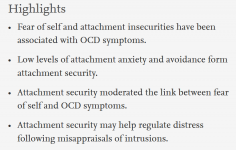David Clark's Cognitive Approach to OCD
The word “intrusive” has a pathological connotation, but most thoughts are intrusive, that is, they come to the thinker unbidden. Very few thoughts are produced intentionally. Pointing this out to patients and not referring the obsessive thoughts as “intrusive” helps to normalize patients’ appraisals of their thoughts and of themselves.
The word “intrusive” has a pathological connotation, but most thoughts are intrusive, that is, they come to the thinker unbidden. Very few thoughts are produced intentionally. Pointing this out to patients and not referring the obsessive thoughts as “intrusive” helps to normalize patients’ appraisals of their thoughts and of themselves.

